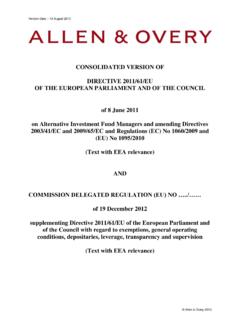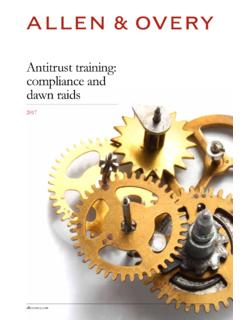Transcription of Fintech - Allen & Overy
1 Offers expertise across the TMT sector, and handles mandates spanning multiple jurisdictions. Provides full coverage of key practice areas, including regulatory compliance, competition, litigation, M&A, outsourcing and financings. Notable activity in emerging areas such as financial technology, big data and cloud computing. Chambers Global 2015 (TMT: Global-wide) They are one of the best in terms of the quality of the work. They are very flexible, experienced and knowledgeable, and are proactive in putting forward solutions. Chambers Europe 2017 (Banking & Finance: Europe-wide) Ranked Tier 1 for Financial Services Regulatory: Non-contentious IFLR1000, UK, 2017 Fintech | 20172 Allen & Overy LLP 2017 Market participants may be providers of technological solutions which bring innovation to traditional financial services companies or they may be companies delivering innovative financial services offerings which disrupt the existing financial services market.
2 What unites Fintech players is the pursuit of new ideas and business models to bring digital transformation to all aspects of the heavily regulated financial services industry. Today s Fintech market has been characterised by a period of significant growth. However it is also a crowded space in which participants need to have a clear competitive edge to survive. As the market matures survival or failure can increasingly be ascribed to success in certain key areas. These are: Getting regulatory compliance right; Making the right partnerships at the right time on the right terms; and Driving adoption by ensuring excellent user a track record of providing high-quality and innovative legal advice, Allen & Overy is ideally placed to guide market participants through all business and legal issues in this thriving sector. As a recognised banking powerhouse we have a huge knowledge base and extensive experience of advising on financial services regulation.
3 In addition, our strong connections with the leading financial services authorities mean we can support our clients in all their dealings with local regulators. We marry this regulatory expertise with deep and broad experience in the technology sector. We have advised on some of the cornerstone projects in the banking technology market and we also work with some of the most successful technology companies of the 21st century. From growth companies to established market players, we know what it takes to succeed in describes the intersection between finance and technology is transforming financeInvestment management Cloud and big data have already rung the changes in the investment management industry but a new shift has come with the application of machine learning and artificial intelligence and thereby the arrival of the One of the slower areas of Fintech to take off, insurtech is now gathering steam. Investment is being driven in particular by established insurers investing in new market entrants, and hot areas of technology include blockchain and smart contracts, data analytics and Internet of Things applications which can assist with risk identification and , cards schemes and acquirers and payment processors are the traditional players in the payments landscape.
4 New entrants focus on taking the friction out of the payments process and include providers of mobile payments, contactless and eWallets. Trends in this area include further developments with biometric identification and greater use of big data to halt fraudulent | 20174 Allen & Overy LLP 2017 Process efficiencies For many, Blockchain is the perfect example of the evolutionary power Fintech can have on process optimisation. But Regtech is another subsector of the process efficiencies market to receive significant investment and interest. Regtech applications look to save organisations time and money by automating processes to ensure regulatory compliance. They also offer the possibility of more accurate compliance efforts, and better reporting to supervisory and lending Peer-to-peer or marketplace lending is the most prominent example of the impact of Fintech on deposits and lending. This part of the market has matured to show a particular symbiosis between established players and new entrants, with P2P lenders, for example, picking up the portion of the SME lending market in which banks on the whole had preferred not to participate since the financial crisis.
5 P2P lenders have turned to established institutions in other ways also, such as by pushing out parcels of loans to hedge funds and other institutional investors via their online marketplaces (something that has arguably given P2P platforms greater exposure to the credit cycle than the pure P2P model).Fundraising Crowdfunding (both equity and reward-based) has become an established part of the early stage company market, particularly for consumer facing companies for which engagement with investors is all part of the spectrum of engaging customers. Platform-based tech has also facilitated the rise of syndication of early stage investment, particularly in the angel market where a syndicate typically allows less experienced investors to co-invest with more established and regulatory issuesRegulatory requirementsRegulatory compliance is fundamentally important to Fintech companies, and can be a key competitive advantage, but navigating the relevant regulatory regimes is a significant headache for many.
6 Most Fintech companies will have undertaken a detailed analysis of their business model against applicable financial regulation to fully understand what can be achieved without becoming a regulated entity, or, conversely, to help them seek appropriate licences or approvals. However attempts to map regulation can be complicated by the fact that it can be very hard to assess whether innovative new products fall within the regulatory regimes, and if they do, how the various requirements might apply. This problem is compounded for Fintechs scaling internationally, where different regulatory approaches in other jurisdictions can create additional hurdles (albeit the UK s Fintech Bridges initiative is one example of attempts to mitigate such problems).Regulatory uncertainty makes business planning very difficult, and indeed the financial and compliance cost of regulation has been sufficient to see some new companies exit the market.
7 A clear-sighted assessment of regulatory risk is fundamental to Fintech with dataData is central to the business models of many Fintechs, whether they are focusing on retail or investment banking. Companies that are able to derive business insights from financial services data can spot and maximise new opportunities and reduce risk. Unlocking this value is however dependent on far more than clever algorithms and exponential processing power. It is also essential that companies in this space build and maintain the trust of consumers and other stakeholders. As a result, concepts of security and transparency are essential industry principles in the Fintech sector for both reputational and compliance is significant regulatory activity in this area. Aside from the obvious legislative changes affecting data handling and cybersecurity, such as the implementation of the new General Data Protection Regulation in Europe, a shift to open banking is a further complication on the data horizon.
8 The new European Payment Services Directive (PSD2), the UK s recent retail banking market investigation from the Competition and Markets Authority and the promotion of data sharing by the Monetary Authority of Singapore are all examples of how regulators across the globe are focusing on data as a way to bring change to the traditional vertically integrated banking model. Such changes require considerable sophistication from data owners and processors. In particular, there is a tension between the concept of open innovation as a route to bringing new players into the market, and the appetite for more control and ownership over data (as a valuable business asset). Intellectual property concerns, as well as privacy considerations, loom large here. The growth of new data handling models may also foster a co-creation environment in financial services where partnerships (eg JVs, strategic alliances etc) might be the optimum way to bring diverse parties innovationThe development of innovative software and technology by Fintech companies has been critical to the rapid expansion in this sector.
9 Legal protection for such innovation is integral to success in the Fintech sector, but the availability of protection varies from jurisdiction to jurisdiction. While business methods were previously thought to be patentable in the this has become increasingly difficult through recent case law. In Europe, meanwhile, they are per se unpatentable unless they can be shown to solve a technical problem . Given these difficulties, Fintech companies must consider carefully the availability of other IP rights, such as copyright and trade secrets, as well as protecting themselves through contractual arrangements with their customers, employees, suppliers and/or other third parties. A strategic challenge in areas such as blockchain is how to balance the protection of ideas and technology with the desire to encourage industry-wide adoption. Where there may be so-called network effects from new technology, the timing for seeking to register and/or enforce intellectual property rights is critical.
10 Done too soon and the risk is that innovation is stifled, left too late and Fintech | 20176 Allen & Overy LLP 2017it is possible to be locked out of the market by peers and importance of intellectual property to Fintech companies may also make them a target for patent trolls, which may cause business disruption unless the Fintech enters into licensing discussions or is prepared to fight a claim in the , investing and acquiring to bring innovation into the businessMany established financial institutions recognise the benefit that financial innovators are bringing to the market. Frequently financial institutions look to partner with emerging technology players to speed up the innovation cycle. A fundamental question is what form that collaboration might take. The heat in the Fintech market is certainly driving M&A as companies buy in technology and skills or combine with peers to build scale, but commercial collaborations are also a popular route to achieving these goals.
















